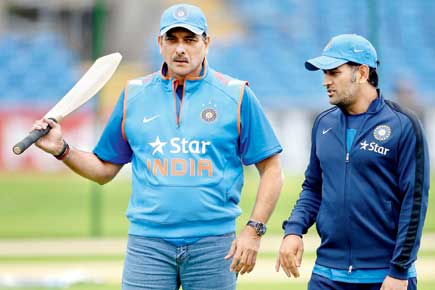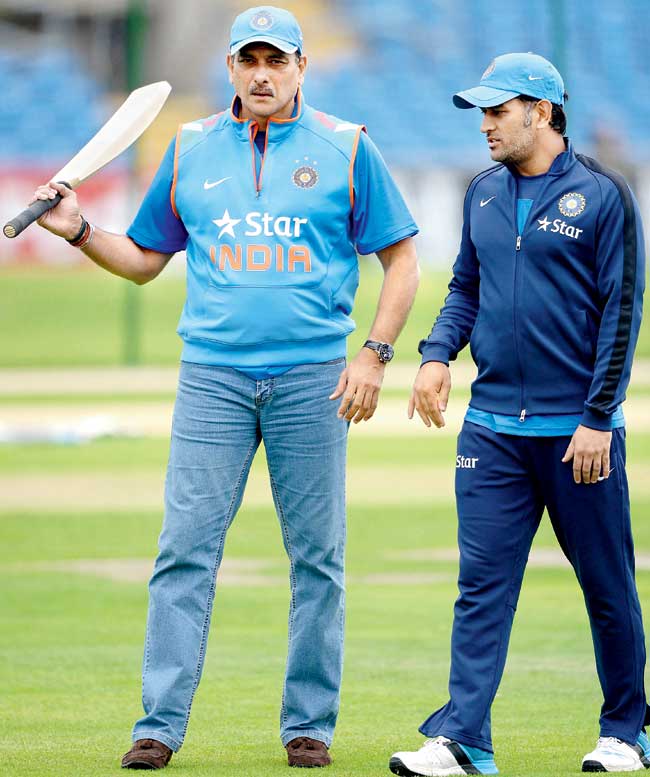For someone who took great pride in his performances away from home like most successful Test players, Ravi may just be the lubricant Indian cricket needs, writes Shishir Hattangadi

Ravi Shastri talks with India skipper MS Dhoni during a practice session at Headingley last week. Pic/Getty Images
All those who know Ravi Shastri since his early days will know he is non-compromising and ahead of the game when it comes to cricket. In the early 80s, when he was fast tracked to New Zealand to replace an injured Dilip Doshi, Shastri picked up 15 wickets in three Test matches.
Ravi Shastri talks with India skipper MS Dhoni during a practice session at Headingley last week. Pic/Getty Images
ADVERTISEMENT
The day he came back, some of his university teammates congregated for a chilled something at Hotel Naaz at Malabar Hill. His first assessment was he would be ready to bat in the first six for India in the coming season.
Analysing talent
I remember his confession made some of us snigger at his drastic spot analysis of his own batting talent. He was sure he had figured out how to bat at the highest level. Having watched him score in local cricket as well as at college and university level, we knew he had the make up to score runs, but his reading of the art of scoring runs at Test cricket was an eye opener.
His words were, "one should know where your runs are, and know when you have to defend. Test cricket is a battle of attrition, not a walk in the park."
Over the years, his metamorphosis to a top quality batsman was not a surprise to those who saw him at the domestic level but there was a keen sense to imbibe from observing players in form against top quality bowling.
Learning from others
One night he insisted on watching an in-form Dean Jones bat positively against the fearsome West Indian quicks. He was observing Deano's initial movements that gave him a split second advantage to get into position.
Yes, today we term it as 'trigger' movement or some such technical prescription. Shastri's keenness was to see the head position and the balance of the in-form Deano. He wanted to do things his way but by figuring out from others who were successful.
The ability to learn is inherent. Some have to work harder, some do it naturally. Shastri's strength has been good observation and corrective solutions. How to pick the right answers to questions bowlers pose comes with great introspection and a belief that the answers lay in the person himself. Shastri may just be the right man to help find those answers for batsmen who may find that difficult.
His presence in the dressing room could be comforting yet candid. Talking turkey in the dressing room is something he has done during his playing days. The need for players to switch off after a hard day's play is something he would propagate. A good rapport with the administration suggests his voice will be heard, if he has an observation.
His appointment as Team Director was short term and may have been a knee-jerk reaction for the sudden slump in the Test series, but it sent out a clear message to the team management.
His value to the team in the locker room shouldn't be judged by the predictable performance in the one-days or during a home Test series. It may be dissected after a hard Test series in Australia.
For someone who took great pride in his performances away from home like most successful Test players, he may just be the lubricant Indian cricket needs for a rusty Test series in England. He will be at the crossroads of an important decision as regards his career. It will be interesting to see if he loves his voice more in the commentary box or whether the BCCI needs him in the dressing room.
Shishir Hattangadi is a former Mumbai Ranji Trophy captain
 Subscribe today by clicking the link and stay updated with the latest news!" Click here!
Subscribe today by clicking the link and stay updated with the latest news!" Click here!






